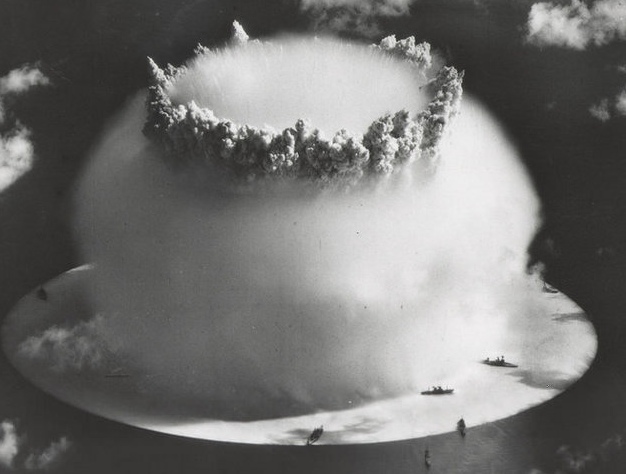 Erik Voeten has a nice piece up about recent research on the benefits of nuclear superiority. Does nuclear superiority provide an advantage to states engaged in crisis bargaining?
Erik Voeten has a nice piece up about recent research on the benefits of nuclear superiority. Does nuclear superiority provide an advantage to states engaged in crisis bargaining?
In the most recent issue of International Organization (ungated version) my colleague Matthew Kroenig argues that in a crisis between two nuclear powers, the state that enjoys a nuclear advantage is willing to run more risk than its opponent. This gives the nuclear superior state greater “effective resolve,” meaning that the other state is less likely to think that the state with nuclear superiority will back down.
However:
The same issue of International Organization contains an article (ungated version) by Todd Sechser and Matthew Fuhrman, who claim that nuclear weapons are of no use in increasing the credibility of threats to seize territory or another asset. Moreover, using nuclear weapons is costly. Thus, they find that while nuclear weapons are extremely useful for deterrence, they do little for “compellence” (making a threat to force an opponent to take some desirable action). They show with a different data set of crisis bargaining that threats from nuclear states are not more likely to succeed than threats from non-nuclear states.
Erik’s sympathies appear to lie with Sescher and Fuhrman. After summarizing Kroenig’s piece, Erik argues that, “The data set is small. Although Kroenig does a good job controlling for possible confounding factors, there really is no good way to draw causal inferences from data like this.”
But here’s the interesting part. We have two articles that were, by the standards of contemporary political science, of sufficiently high quality to find publication in one of the premiere journals in International Relations. But they have very different policy implications for current (and potentially high-stakes) debates. In an era when political scientists are going out of their way to push research that bears directly on policy concerns, what should we do with such a situation?
At one level, Erik’s approach seems sensible: publicize the research but note your own take on the subject. I expect Kroenig will respond cogently. That’s great for political-science discussions, but how are policymakers and non-academics to interpret such an exchange? The situation strikes me as unsatisfactory. If our mission is to prove that our work “matters” and thus, for example, deserves public funding… then, well, okay. But if our mission is to better shape policy, then what? Indeed, I suspect most “consumers” of this kind of debate will simply accept the position that fits with their prior commitments.
Lest we think the issues here are hypothetical, consider that Kroenig’s (related) work arguing that nuclear superiority deters other states from initiating crises has already made it into the policy discussion (PDF). Obviously, if Kroenig’s right that’s not a substantive problem. But the debate over the issue suggests that “we” don’t have anything approaching a settled answer, which takes us back to the bigger issue, How do “we” present work as “political science” in a way that (1) does justice to its scholarly nature but (2) also signals the most important thing about its social-scientific quality–that its findings are likely far from settled?
And that’s before we even delve into the kinds of methodological debates that make an enormous difference, but are unlikely to make sense to most of the policy community. For perspective, compare the satirical piece I linked to below.
Daniel H. Nexon is a Professor at Georgetown University, with a joint appointment in the Department of Government and the School of Foreign Service. His academic work focuses on international-relations theory, power politics, empires and hegemony, and international order. He has also written on the relationship between popular culture and world politics.
He has held fellowships at Stanford University's Center for International Security and Cooperation and at the Ohio State University's Mershon Center for International Studies. During 2009-2010 he worked in the U.S. Department of Defense as a Council on Foreign Relations International Affairs Fellow. He was the lead editor of International Studies Quarterly from 2014-2018.
He is the author of The Struggle for Power in Early Modern Europe: Religious Conflict, Dynastic Empires, and International Change (Princeton University Press, 2009), which won the International Security Studies Section (ISSS) Best Book Award for 2010, and co-author of Exit from Hegemony: The Unraveling of the American Global Order (Oxford University Press, 2020). His articles have appeared in a lot of places. He is the founder of the The Duck of Minerva, and also blogs at Lawyers, Guns and Money.


We could design fora that embrace the pragmatic/juridical definition of truth on which the best answer is the one that emerges from a community of discussion rather than from the analysis of one person, in one office, with one dataset. That is, put Kroenig, Sescher and Fuhrman (Voeten too) in a room and make them confront policy questions together. I suspect there are institutions that do this already, but perhaps policy recommendations should be made to prominently emerge from these places rather than from the conclusions of papers.